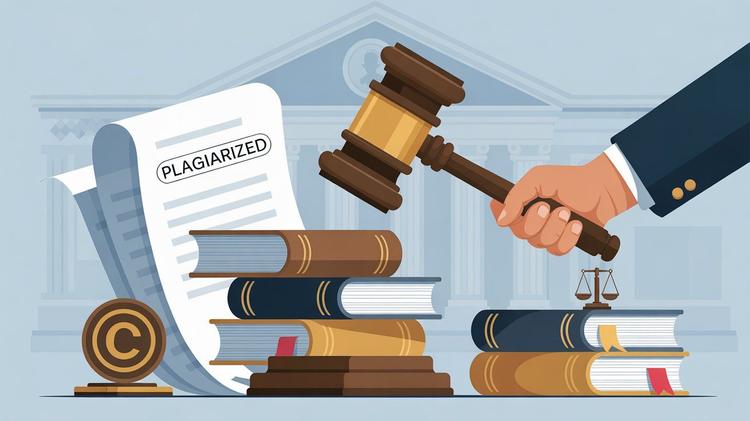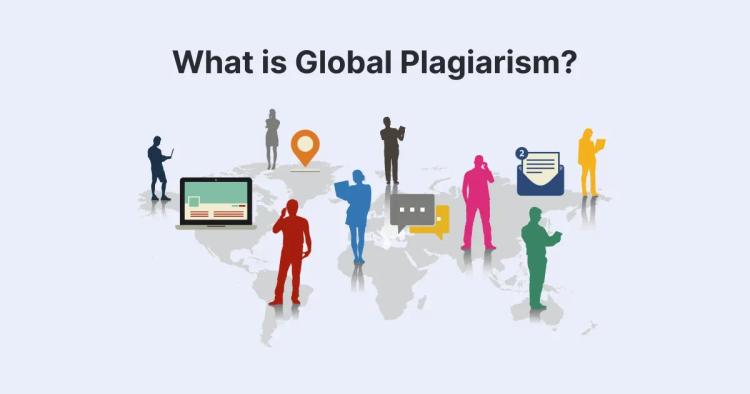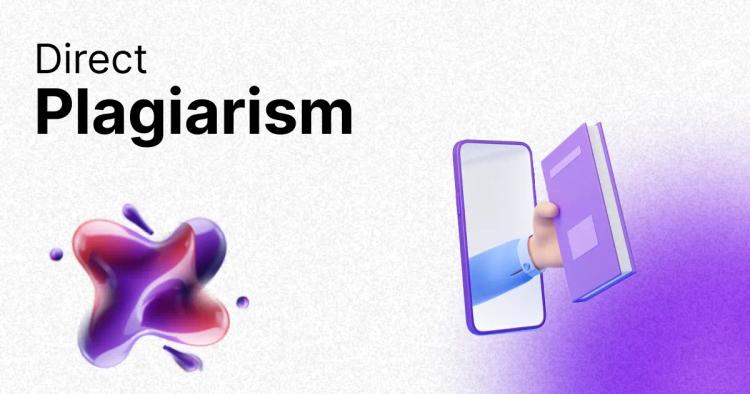Plagiarism is plain stealing. You can face serious consequences that stick with you longer than you would want.
Getting caught plagiarising only once might lead to a lifetime of repercussions. From getting expelled from school to serious legal trouble like jail, plagiarism is never worth it.
ᴀᴅᴠᴇʀᴛɪsᴇᴍᴇɴᴛ
What Is Plagiarism?
Plagiarism is when you use someone else’s work or ideas without giving proper credit and pass it off as your own. You can even plagiarise yourself by reusing past work without citations.
It does not matter if you copy a whole paragraph, paraphrase too closely, or only reuse an idea, all of these count as plagiarism and dishonesty.
There are different types of plagiarism. Common ones are:
- Direct Plagiarism: Copying someone else’s words exactly without quotes or credit.
- Global Plagiarism: Stealing someone’s entire work.
- Self-Plagiarism: Reusing your own previous work and presenting it as new work without citing yourself.
- Paraphrasing Plagiarism: Changing a few words but keeping someone else’s ideas or structure without citing the source.
- Accidental Plagiarism: Unintentionally failing to cite a source correctly or forgetting to use quotation marks.
- AI Plagiarism: Using text generated by AI tools without disclosing or crediting the AI as a source. Very relevant in today's generative AI world.
Is Plagiarism Punished By Institutions?
Yes. Most schools, colleges, and workplaces have strict rules against plagiarism. You will face both academic and professional consequences of plagiarism.
If you are in school/university, or writing cutting-edge research, you should be able to find your institution's plagiarism policy on their website.
In a professional setting, employers have similar rules. They can fire you for stealing someone’s ideas and work. Some licensing boards may even revoke your professional license for serious offenses. Which is why using a plagiarism checker is a must.
ᴀᴅᴠᴇʀᴛɪsᴇᴍᴇɴᴛ
Consequences Of Plagiarism You Should Be Aware Of
Getting caught plagiarising can have serious consequences from career sabotage to legal problems. Let’s break them down one by one. Understanding these risks can help you steer clear of serious headaches down the road.
Academic Consequences
- Failing Assignments: If your teacher finds out, you can get a zero. That will hurt your GPA.
- Course Failure: Sometimes a single plagiarism incident can get you an “F” for the entire course.
- Suspension or Expulsion: Repeat offenses or extreme cases can get you expelled.
- Blocked Transfers: Future schools or employers might see that you cheated. That can block your transfer or grad-school applications.
- Loss of Scholarships: If you’re on scholarship, it can be revoked by the institution.
Professional and Career Consequences
- Reputation Damage: Word gets around. Peers, employers, and clients may not trust you if your plagiarising offense becomes known.
- Termination of Employment: Companies don’t tolerate ethical malpractice like plagiarism.
- Difficulty Finding New Jobs: Background checks and references matter. It may get hard to get a new good job.
- License & Certification Revocation: In fields like law, medicine, or education, licensing boards might strip you of credentials if you plagiarize.
Legal Consequences
- Copyright Infringement Lawsuits: If plagiarism crosses into using copyrighted material without permission, you can face lawsuits with hefty fines.
- Jail Time: In extreme willful cases, courts may hand down criminal charges which can land you in jail.
- Defamation or Fraud Claims: If you falsely claim someone else’s work as your own in a professional context, you can face additional claims.
Apart from these there are also social and personal consequences. You will lose respect from your peers, family and acquaintances. Plagiarising will also hamper your skill development.
You can also read our article about the consequence of plagiarism in SEO content writing.
ᴀᴅᴠᴇʀᴛɪsᴇᴍᴇɴᴛ
What Percentage Of Plagiarism Is Tolerated?
Technically no amount of plagiarism is acceptable. However, plagiarism checking tools check for similarity between texts using computer algorithms. This might lead to some false positives.
So, even if an automated checker flags a small percentage of your content as plagiarised, it can be overlooked and some institutions do. For example, educational institutions allow 10-15% plagiarism.
The bar is higher for professional or research work where the idea is to keep it below 10%. The key takeaway is no plagiarism is acceptable but due to how duplicate detection tools work, some leeway is given. You should always aim for 0% plagiarism and try your best to avoid it altogether.
Frequently Asked Questions
1. Can I paraphrase without quoting?
Yes—but only if you rewrite in your own language and still cite the source. Otherwise, it’s “consequences of moderate plagiarism.”
2. What if I forget to add a citation by accident?
It still counts as plagiarism. You might get a warning the first time (plagiarism suspension or probation), but fix it ASAP.
3. Does using a plagiarism checker eliminate all risk?
No. Tools catch exact matches, but they can miss poorly paraphrased or translated content. Always double-check your citations.
4. How do I know if I’ve self-plagiarized?
If you submit the same text (or very similar) from past coursework or publications without credit, that’s self-plagiarism. You could face “self-plagiarism consequences” like probation or funding loss.
5. Can I negotiate penalties if I get caught?
Some professors or employers offer a chance to rewrite or undergo integrity counseling. But serious cases (plagiarism, expulsion or job loss) aren’t negotiable.
ᴀᴅᴠᴇʀᴛɪsᴇᴍᴇɴᴛ
Wrapping Up
-
Plagiarism might seem like a shortcut, but it carries real risks and can have consequences - even legal troubles.
-
The consequences of plagiarism can range from a failed assignment to losing your job. For serious offenses, you might also end up in jail.
-
There really is no safe percentage of plagiarism—aim for originality and proper citation. Stay honest, do your own work, and you’ll avoid the headaches that come with plagiarising.
-
Stay original, cite properly, and always do a final scan with a plagiarism scanner like CopyChecker before submitting.







